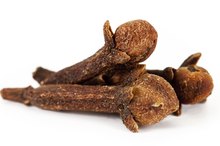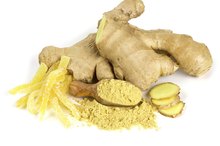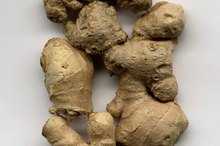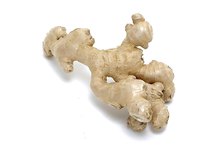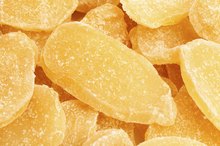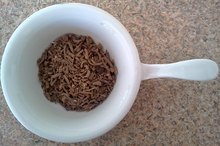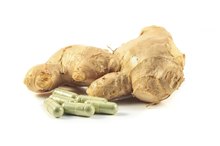Can You Eat Too Much Ginger?
Ginger has no known dose that causes toxicity, and serious side effects from consuming ginger are rare. However, if you want to use ginger medicinally, it’s still best to proceed with caution and consult a doctor before beginning because minor side effects are possible from the over-consumption of ginger and it can interact with certain drugs. Ginger is often used for pregnancy-related nausea, motion sickness, nausea following medical treatments and to fight inflammation.
Effects of High Quantity
When ginger is consumed in extremely high quantities it can cause diarrhea, mouth irritation and heartburn, according to University of Maryland Medical Center. Bloating, flatulence, stomach upset and sedation are other possible side effects.
Drug Interactions
Ginger & Heart Rate
Learn More
If you have a bleeding disorder, avoid consuming ginger, because it may worsen your condition, according to the University of Maryland Medical Center. Consuming ginger along with blood-thinning medicines, such as aspirin and warfarin, also raises your risk for bleeding or bruising. Your risk of bruising or bleeding due to consuming ginger also is raised when you use other herbs that affect blood platelet aggregation, such as garlic, danshen, turmeric and ginkgo biloba.
Also consult a doctor before eating ginger if you have diabetes or take drugs to treat high blood pressure. You increase your risk of hypoglycemia -- low blood sugar -- if you consume ginger while taking diabetes medicines such as insulin, miglitol and glyburide. If you take ginger with medicines to treat blood pressure, it may interfere with the drug’s action.
- If you have a bleeding disorder, avoid consuming ginger, because it may worsen your condition, according to the University of Maryland Medical Center.
- Your risk of bruising or bleeding due to consuming ginger also is raised when you use other herbs that affect blood platelet aggregation, such as garlic, danshen, turmeric and ginkgo biloba.
Digitalis Danger
If you use digitalis to treat a heart condition, eating too much ginger will be harmful because it will increase the effects of this drug. Symptoms of digitalis toxicity include an irregular pulse, palpitations, confusion, appetite loss, diarrhea, nausea and vomiting. Rarely this toxicity leads to vision disturbances such as seeing spots, blurred vision, seeing bright spots or lights or halos around objects. Other symptoms may include decreased urine output, overall swelling, decreased consciousness, a hard time breathing when lying down and excessive urination at night.
- If you use digitalis to treat a heart condition, eating too much ginger will be harmful because it will increase the effects of this drug.
- Other symptoms may include decreased urine output, overall swelling, decreased consciousness, a hard time breathing when lying down and excessive urination at night.
Allergy
Remedies for Nausea When Coughing
Learn More
No amount of ginger is safe if you are allergic to it. Symptoms of an allergic reaction include tightness in your chest, swelling in your mouth, face or throat, itching, difficulty breathing, hives or a rash. Seek immediate medical attention if you have these symptoms after consuming ginger.
Related Articles
References
- University of Maryland Medical Center: Ginger
- “The Essential Herb-Drug-Vitamin Interaction Guide”; George T. Grossberg and Barry Fox; 2007
- “Medical Toxicology of Natural Substances”; Donald G. Barceloux; 2008
- “Meyler’s Side Effects of Herbal Medicines": J. K. Aaronson; 2008
- MedlinePlus: Digitalis
- Ryan JL. Treatment of chemotherapy-induced nausea in cancer patients. Eur Oncol. 2010;6(2):14-16.
- Marx W, Ried K, McCarthy AL, et al. Ginger-mechanism of action in chemotherapy-induced nausea and vomiting: A review. Crit Rev Food Sci Nutr. 2017;57(1):141–146. doi:10.1080/10408398.2013.865590
- Panahi Y, Saadat A, Sahebkar A, Hashemian F, Taghikhani M, Abolhasani E. Effect of ginger on acute and delayed chemotherapy-induced nausea and vomiting: a pilot, randomized, open-label clinical trial. Integr Cancer Ther. 2012;11(3):204–211. doi:10.1177/1534735411433201
- Haniadka R, Rajeev AG, Palatty PL, Arora R, Baliga MS. Zingiber officinale (ginger) as an anti-emetic in cancer chemotherapy: a review. J Altern Complement Med. 2012;18(5):440–444. doi:10.1089/acm.2010.0737
- Arslan M, Ozdemir L. Oral intake of ginger for chemotherapy-induced nausea and vomiting among women with breast cancer. Clin J Oncol Nurs. 2015;19(5):E92–E97. doi:10.1188/15.CJON.E92-E97
- Bossi P, Cortinovis D, Fatigoni S, et al. A randomized, double-blind, placebo-controlled, multicenter study of a ginger extract in the management of chemotherapy-induced nausea and vomiting (CINV) in patients receiving high-dose cisplatin. Ann Oncol. 2017;28(10):2547–2551. doi:10.1093/annonc/mdx315
- Palatty PL, Haniadka R, Valder B, Arora R, Baliga MS. Ginger in the prevention of nausea and vomiting: a review. Crit Rev Food Sci Nutr. 2013;53(7):659-69. doi:10.1080/10408398.2011.553751
- WholeHealth Chicago. Ginger. Updated May 12, 2009.
- Oncology Nutrition: a Dietetic Practice Group of the Academy of Nutrition and Dietetics. Dietary supplements.
- Marx W, Mckavanagh D, Mccarthy AL, et al. The effect of ginger (Zingiber officinale) on platelet aggregation: a systematic literature review. PLoS ONE. 2015;10(11):e0143675. doi:10.1371/journal.pone.0141119
- Chuah SK, Wu KL, Tai WC, Changchien CS. The effects of ginger on gallbladder motility in healthy male humans. J Neurogastroenterol Motil. 2011;17(4):411-5. doi:10.5056/jnm.2011.17.4.411
- National Center for Complementary and integrative Health. Ginger. Updated November 30, 2016.
- Bossi, P., Cortinovis, D., Fatigoni, et al. A Randomized, Double Blind, Placebo-Controlled, Multicenter Study of a Ginger Extract in the Management of Chemotherapy Induced Nausea and Vomiting (CINV) in Patients Receiving High Dose Cisplatin. Annals of Oncology. 2017. 28(10):2547-2551.
- Haniadka, R. et al. Zingiber officinale (Ginger) as an Anti-Emetic in Cancer Chemotherapy: A Review. Journal of Complementary and Alternative Medicine. 2012.18(5):440-4.
- Jordan, K., Jahn, F., and M. Aapro. Recent developments in the prevention of chemotherapy-induced nausea and vomiting (CINV): a comprehensive review. Annals of Oncology. 2015.26(6):1081-90.
- Pillai, A. et al. Anti-emetic effect of ginger powder versus placebo as an add-on therapy in children and young adults receiving high emetogenic chemotherapy. Pediatric Blood and Cancer.2011.56(2):234-8.
Writer Bio
Linda Tarr Kent is a reporter and editor with more than 20 years experience at Gannett Company Inc., The McClatchy Company, Sound Publishing Inc., Mach Publishing, MomFit The Movement and other companies. Her area of expertise is health and fitness. She is a Bosu fitness and stand-up paddle surfing instructor. Kent holds a bachelor's degree in journalism from Washington State University.

